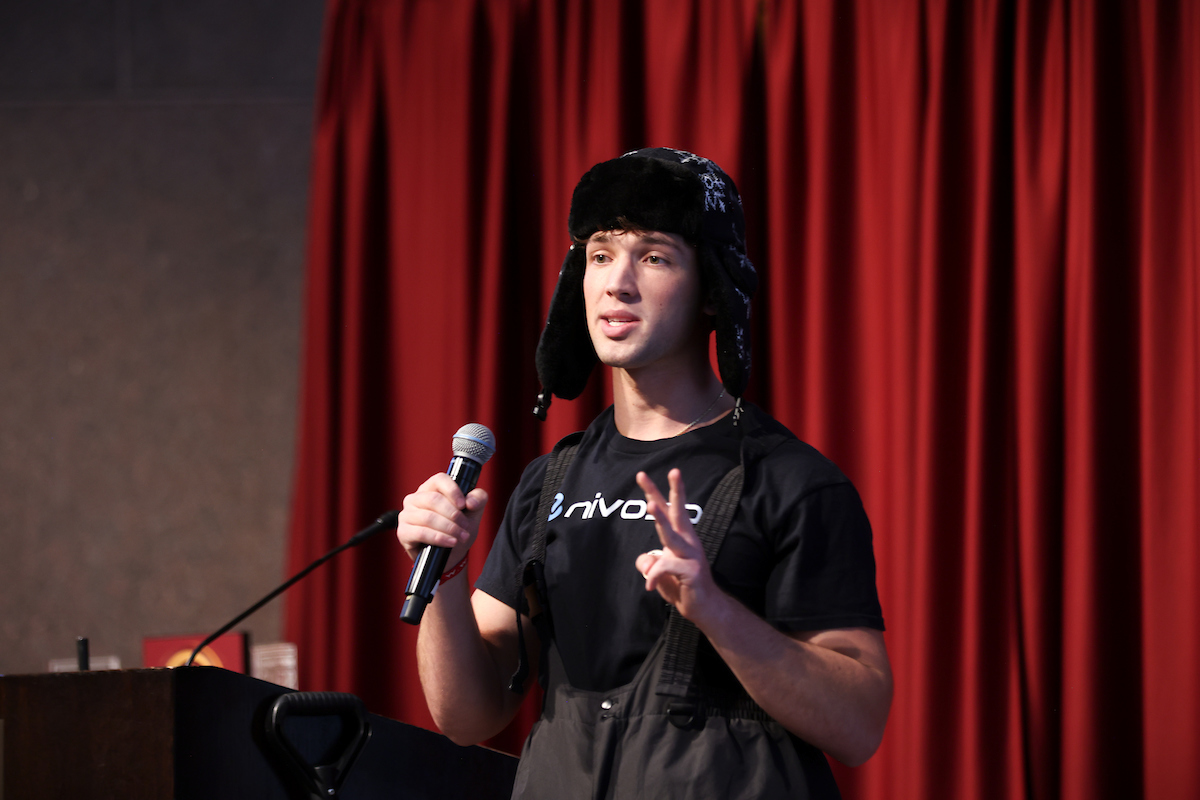
Max Minakov, University of Minnesota (Carlson)
ROBOTS, ARTIFICIAL INTELLIGENCE, AND DRONES
Max Minakov, a senior at the University of Minnesota’s Carlson School, has even branched out into robotics. His startup, Nivoso, markets robots that clear driveways and sidewalks for “zero-tolerance facilities (i.e. elderly care centers). Minakov brands it as a “Roomba for snow” – a dream he has pursued since pitching the concept as his 6th grade science fair project. His long-term vision?
“I want people to see Nivoso robots at the hardware store right next to a snow blower and people be faced with the choice of whether or not they want to back pain from manually plowing the rest of their life. Additionally, I hope every nursing home and other zero-tolerance facility in the country will have their sidewalks consistently cleared by Nivoso robots during every snowstorm.”
Could it become a reality? Thus far, Minakov has boostrapped $30,000 – on top of his $27,700 competition winnings. And he has racked up an impressive list of milestones thus far: “Filing utility patents, receiving LOIs from the largest nursing homes and snow-clearing companies in the state, completing our MVP, pitching to Fortune 500 companies at age 16, and being a Grand Finalist at the MN CUP and winning the student division.”
Some business majors are looking to do well and do good. Case in point: Crossroads, a Cornell University venture that provides an outlet for Nigerian artisans to sell their goods in the United States – with profits used to support a health clinic in their country. Capitalizing on the advent of AI, Tony Sims II launched Apollo Music at Washington University. Think of it is a platform where musicians can come to write, share, and collaborate together using AI tools. By the same token, Piotr Lazarek’s passion is agriculture – and soil testing, in particular. The Wharton student describes the process as “costly, labor-intensive, and time-consuming.” To reduce these obstacles, he helped develop a high-tech system using satellite imagery and drones to identify soil areas that are productive or lagging. The idea for Nirby, Lazarek says, came from the setbacks endured by a farmer he knew.
“Mark suffered a devastating crop failure due to an elevated concentration of aluminum ions in his soil. This setback, which had severe financial implications for Mark, could have been entirely preventable. A simple preventative soil test would have identified the issue, allowing Mark to take corrective measures. However, Mark, like many other farmers, was deterred from such testing. The reason? Conventional soil testing is a daunting process…Our sophisticated system maps out farmland productivity zones and executes comprehensive, multi-layered soil spectroscopy measurements. This allows for swift, yet thorough analysis of soil health. Armed with our precise, data-driven recommendations, farmers are equipped to optimize fertilizer consumption and increase crop yields.”
FROM TROUBLED CHILD TO LIFE-LONG LEARNER
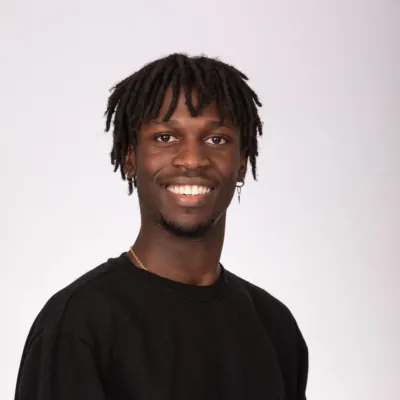
Matthew Grant, USC (Marshall)
Stories like Mark often often sparked startup ideas among business majors. At Southern Methodist University, Jude Lugo noticed how inefficiently that classroom attendance was taken. Rather than griping, Lugo created an app – LectureLogger – that is now used for attendance purposes by a quarter of the school. With use of ChatGPT skyrocketing among college students, a team of UC Berkeley students also witnessed a gap emerging. Friends and family “outside the Silicon Valley bubble” unable to take advantage of AI. This motivated them to develop Scribble AI, a mobile interface where users can produce content using generative AI. At USC Marshall, Matthew Grant launched his UpDonor platform to provide nonprofits with tools to replace their “outdated, inefficient, non-compliant tech solutions.” Luiz Andrade has already pitched his venture to Shark Tank’s Kevin Harrington. His startup – Risk Technologies – is an outgrowth of a 20-client consulting firm that he started at 16 – one that earned a $15,000 investment from Amazon Web Services. The goal for Risk Technologies, says the Villanova University junior, is to help his country make sense of its complex, murky and conflicting regulations.
“Every day, small Brazilian entrepreneurs grapple with Brazil’s intricate tax system, a myriad of regulations, and the vital task of managing their monthly finances,” Andrade writes. “Risk Technology steps in as the solution, simplifying this demanding process. Our software empowers businesses to avoid costly mistakes, gain mastery over their financials, and enhance profitability using state-of-the-art data analytics tools.”
In many cases, the ventures reflect deeply personal experiences from the founders. Andrew Shenouda
can remember being held back in first grade, unable to even read until third grade. He viewed himself as the “troubled child” until he received one-on-one tutoring by a professional educator. Suddenly, he “felt seen”, with someone who could explain material in a way that instilled a love of learning. Now a student at Northeastern University’s D’Amore-McKim School of Business, Shenouda is giving back to other struggling learners through his Tadpole startup.
“Tadpole is the Shopify of learning: we’re creating software that makes it easy to build and operate tutoring programs. Handling everything from scheduling and communication to billing and grade tracking, our mission is to make it possible for anyone to become an educator and build a world-class tutoring program in just a couple clicks. Simply put – if we can reduce the barrier of entry to starting and scaling a tutoring program, we can make tutoring more accessible.”
INTEGRATING THE BUSINESS AND ENGINEERING MINDSETS
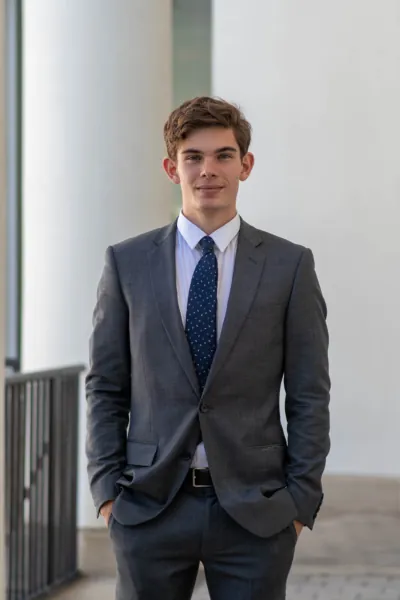
Patrick Latting, Emory University (Goizueta)
Shenouda isn’t alone in building a venture in response to a defining experience. Before starting at Emory University, Patrick Latting experienced the spending, staffing, and scheduling headaches inherent to planning events. Knowing what not to do, he started BidBee to better connect planners with vendors. At Boston University, Astra Wellbeing provides affirming messages to healthcare providers. The idea was rooted in the three founders’ own experiences in healthcare, where they saw first-hand just how much dedication and sacrifice that providers put into their jobs.
“As they entered high school, their lives all took an unexpected turn,” according to the university. “Josh found himself waking up in hospitals with no memory of what had happened due to severe medical conditions; Taha suffered a severe a career-ending sports injury, leading him to a long recovery just to walk again; and Johar said goodbye to his mother for six months as she left his family to battle the COVID-19 pandemic head-on as a frontline critical care physician. These life-altering experiences gave the three a personal, behind the scene, glimpse into the daily heroic efforts of frontline healthcare employees.”
Their lives may have kindled these founders’ startup spirit, but the majors and classes guided them to launching their ventures and beyond. In the case of Piotr Lazarek, the Wharton School has provided a certain balance – a business yang to his engineering yin.
“The business major broadened my horizon beyond the confines of engineering. It taught me that while the beauty of a well-designed system is undeniable, the business side of things requires just as much finesse and precision. The program peeled back the layers of business operations, marketing strategies, and financial complexities that are vital for a product to succeed in the marketplace…Now, I approach our startup with a dual mindset: the precision of an engineer and the acumen of a business strategist. This blend is what now guides our venture, ensuring that our innovations are not only technically sound but also commercially viable and customer-centric.”
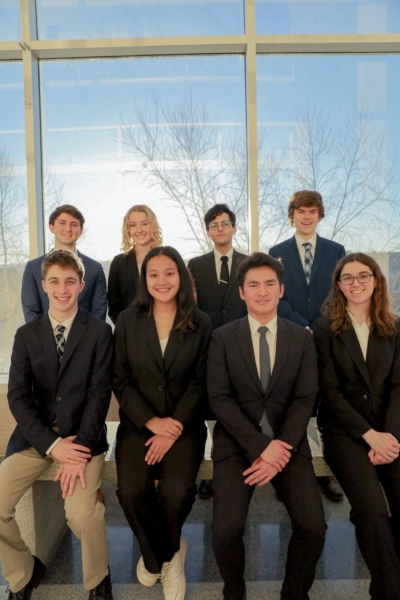
Founders of Crossroads, Cornell University *
LEARNING WHAT REALLY MATTERS: TOUGHNESS
Equally important, business school exposes students to the “right people”, says the University of Minnesota’s Max Minakov. More than that, it enables fledgling founders to draw on their classmates’ expertise, feedback and advice, adds the Scribble AI founders from UC Berkeley. Plus, a business major brings unmatched opportunities, such as Northeastern University’s Semester in San Francisco according to Andrew Shenouda.
“Here, I was able to engage in the entrepreneurial ecosystem there while taking classes that were directly relevant to what would ultimately be of great value to Tadpole: Entrepreneurial Finance, New Venture Development, Entrepreneurship Seminar, and more.”
At Cornell University’s Dyson School, the most valuable course was Entrepreneurial Marketing and Strategy, say the founders of Crossroads. Case-driven and based off the experiences of real entrepreneurs, the biggest takeaways were learning just how rough starting a business can be.
“[Our professors] addressed the parts of entrepreneurship that aren’t glamorous, fun, or exciting – the parts that often define a point where most give up. In this sense, as an organization, we learned grit and perseverance. We were taught the importance of never quitting, maintaining enthusiasm, and pushing ourselves through the most difficult moments in our startup journey.”
THE BEST COURSES FOR STUDENT ENTREPRENEURS
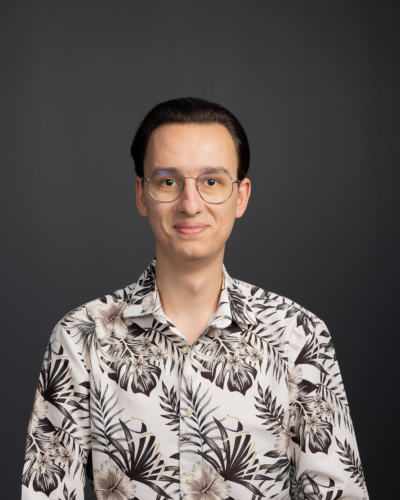
Piotr Lazarek, Wharton School
More surprising, several founders listed Managerial Accounting as the best course for student entrepreneurs. Babson College’s Dylan Zajac observes that accounting principles ensures that non-profits maintain their reputation, as they are operating using “other people’s money.” For Patrick Latting, managerial accounting has been key to identifying and adapting to change.
“That was the class that taught me how to properly budget, which I ended up using almost every day,” adds the Emory University junior. “When conditions change, so does your financial plan. Startup conditions change a lot.”
As always, you’ll find Negotiations-related courses high up on every founder’s favorite course list. That includes Wharton’s Piotr Lazarek, who calls his negotiations course a “transformative experience.” For him, the bombshell was that negotiation was less zero-sum and more win-win, with a heavy dose of “give-and-take.” It trained him how to listen and pursue partnerships grounded in “trust and shared vision.”
“The biggest lesson I gained was that maintaining good relationships is as crucial as closing a deal,” Lazarek adds. “It’s about creating a network of allies, supporters, and collaborators. This class didn’t just equip me with strategies; it instilled a philosophy of empathy, understanding, and respect in negotiations that has been pivotal in partnering with incredible people and organizations, ultimately fueling the growth and success of our startup.”
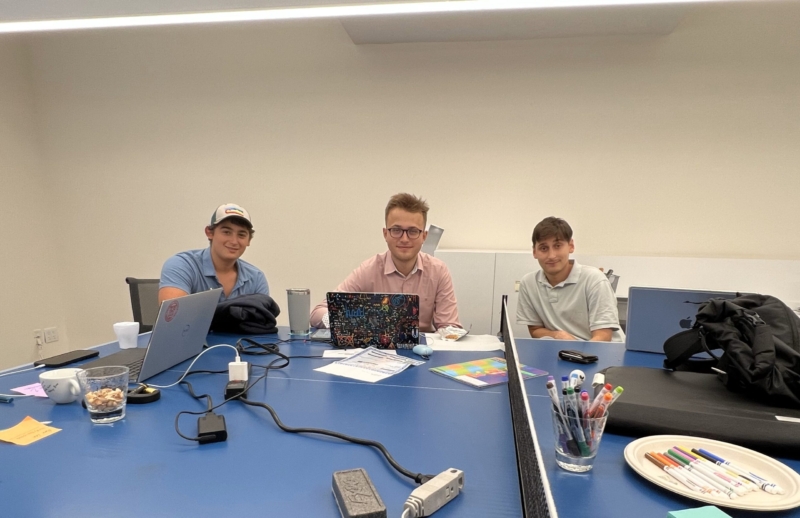
Minno Founders. From left, Alex Barr CEO, Jan Bobrovski, software engineer and Jude Rizzo, advisor. Cornell University (Nolan)
A SUPPORTIVE ECOSYSTEM
Faculty often jumped into the act, lending their ear and expertise – not to mention opening up their business networks to students. At the University of Minnesota, Professor Amee McDonald would customize her assignments for Max Minakov so they would apply to his Nivoso startup. At Cornell University’s Nolan School, Professor Neil Tarallo challenged Minno founders Alex Barr and Jude Rizzo to go after the “innovators” in their market (as opposed to the “early adopters” and “early majority”). The result? Minno’s financial information services has grown three-fold – with outside investment topping $150,000. At the same time, Piotr Lazarek found a guardian angel at the Wharton School in the form of Professor Gad Alon. He shepherded Lazarek’s Nirby venture through its awkward and uncertain early stages.
“His guidance was pivotal in shaping our initial go-to-market strategy, ensuring that it wasn’t just theoretically sound but tailored to the realities of the agricultural tech landscape,” Lazarek explains. “Beyond the initial market entry, Professor Allon’s insights into scaling strategies were invaluable. He challenged me to think big, to envision the venture’s growth not as a straight line but as a series of calculated steps, each building on the last. His emphasis on prioritizing long-term value over short-term gains has informed every strategic decision we’ve made since.”
Each business school’s startup ecosystem – on-campus and beyond – also contributed to the success of these disruptive startups. Minno co-founder Alex Barr points to winning a competition organized by Cornell’s Pillsbury Institute For Hospitality Entrepreneurship, which secured $25,000 n funding and reinforced the firm’s credibility to potential stakeholders. At Washington University, Blake Berg attended events that directly led to funding for his StockSwap venture. While Bloomington, Indiana may not be home to the big investors, the Kelley School compensates with intensive support and resources like The Shoebox incubator.
“This incubator became my home for the next four years, and is the place on campus that helped connect me to all the other resources I ended up getting,” explains Elevate founder Casey Curtis. “Through the Shoebox, I got to meet with a startup law firm (Ice Miller) from Indy once a month for a free legal session. I also met with entrepreneurs and investors from Elevate Ventures, prepared for pitch competitions through High Alpha and Crossroads, and got connected with the Intellectual Property Clinic through the Mauer Law school (and became their client to receive free IP law work).”
Next Page: In-Depth Profiles of 24 Student Startups
Editor’s Note: For the Crossroads photo, Anna Haraka was not able to attend group photo. The remainder of the team: Top Row (L-R): Andrew Darby (Co-Founder, Advisory Board Member), Emily Domek (Chief Marketing Officer), Tyler Senzon (Co-Chief Executive Officer), Eric Tekenbroek (Co-Chief Financial Officer), Bottom Row (L-R): Micah Schuchman (Chief Relationship Officer), Joy Xu (Co-Chief Executive Officer), Tri Vu Kieu (Co-Chief Financial Officer), Mary Addison (Chief Revenues Officer)











Questions about this article? Email us or leave a comment below.